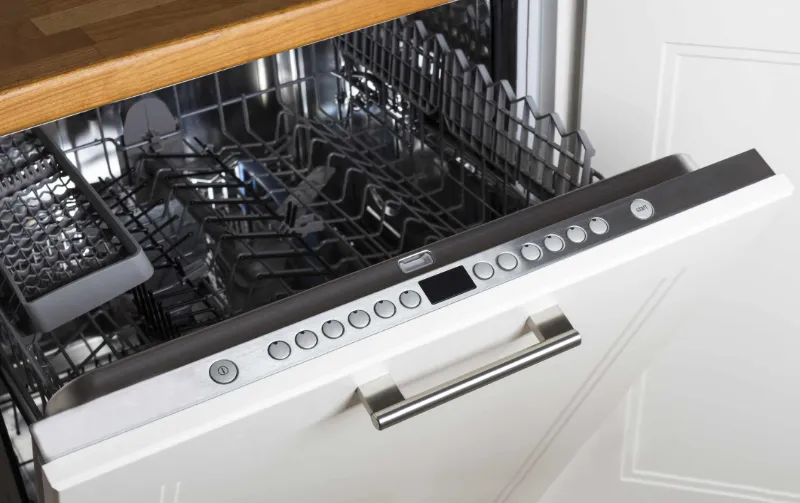On average, a dishwasher is expected to last approximately 10 years. Proper maintenance may extend its lifespan beyond this timeframe.
Choosing a reliable dishwasher is an investment in your home’s efficiency and convenience.
These kitchen workhorses are designed to take the chore out of cleaning dishes, offering homeowners a blend of technology and practicality.
A well-maintained dishwasher not only saves time but also conserves water and energy compared to hand washing.
Users should follow the manufacturer’s guidelines for maintenance and operation to maximize the appliance’s lifespan.
With the evolution of home appliances, new dishwasher models continue to integrate advanced features that promote longevity and sustainability, making an informed purchase vital for long-term satisfaction.
Remember to consider factors like brand reputation, warranty, and user reviews when selecting a dishwasher to ensure that you get a durable and reliable machine.

Factors Affecting Lifespan
Understanding the Factors Affecting the Lifespan of a dishwasher can give you insight into how long you can expect your household appliance to operate efficiently.
While manufacturers might provide an estimated lifespan, real-world longevity can vary significantly based on several factors.
Signs Of A Deteriorating Dishwasher
A dishwasher is an essential home appliance designed to take the hassle out of post-dinner cleanup.
The average lifespan of a dishwasher ranges between 7 to 12 years, but this can vary based on maintenance, brand, and frequency of use.
Knowing when your dishwasher is on its last legs helps in preempting the inconvenience of sudden breakdowns and potential water damage.
Look out for these telltale signs that suggest your dishwasher may soon need replacing.
More Noise During Operation
A quieter kitchen is a happier kitchen. An increase in the noise level during a wash cycle can be a clear indicator that your dishwasher’s internal components are starting to wear out.
A dishwasher functioning optimally should not disrupt the peace of your home.
However, loud or unusual clattering is often a red flag, signaling issues ranging from a loose spray arm to a failing motor.
Inefficient Cleaning
Clean dishes are the endgame. If dishes remain dirty or streaky after running a cycle, your dishwasher might be signaling a deterioration in its cleaning abilities.
This decline in performance can result from several issues:
- Blocked or malfunctioning spray arms.
- Clogged filters restrict water flow.
- Deteriorated seals lead to inadequate water temperature.
It’s worthwhile to check these components and consider whether repair or replacement is the most cost-effective solution.
Leaks Or Water Retention
Water belongs inside the dishwasher, not on your kitchen floor.
Leaks or pooled water around your dishwasher are not just inconveniences; they are critical signs that the integrity of your dishwasher is compromised.
Water retention inside the unit can also indicate a failing pump or blocked drain, leading to water damage and mold growth.
Both scenarios warrant immediate attention, and it might be more economical to invest in a new dishwasher than to repair an older or extensively damaged machine.
Extending Dishwasher Lifespan
Investing in a dishwasher not only adds convenience to your daily routine but also to the ongoing functionality of your kitchen.
Understanding the factors that influence dishwasher longevity is essential to ensuring you get the most value out of your appliance.
With most dishwashers designed to last between 7 to 12 years, taking proactive steps can extend their lifespan even further.
Proper Loading Techniques
Maximizing the effectiveness and lifespan of your dishwasher starts with how you load it.
Following these guidelines will ensure dishes come out clean and your dishwasher remains in good health:
- Scrape off large food particles before placing dishes in the machine.
- Avoid overloading to prevent impairing water circulation and spray arm movement.
- Position dishes so that they face the center spray arms, optimizing water reach.
- Ensure that delicate items like glasses are securely placed in the designated slots to prevent damage.
- Keep larger items on the bottom rack to avoid obstructing the detergent dispenser.
Regular Cleaning And Maintenance
Consistent upkeep is vital to a dishwasher’s performance and life expectancy.
Here are some essential maintenance tasks to keep your dishwasher running smoothly:
- Clean the filter regularly, depending on usage, to remove food residue and buildup.
- Inspect and clean the spray arms to ensure water can flow through them unobstructed.
- Wipe down the gasket and door seals to prevent leaks and ensure a tight closure.
- Run an empty cycle with a dishwasher cleaner every few months to eliminate any grease or limescale buildup.
Using Quality Detergents
The choice of detergent plays an integral role in the health of your dishwasher.
Here’s how you can choose the best for your appliance:
- Opt for detergents that suit your water hardness; hard water may require different formulations.
- Use only dishwasher-specific detergents as they are designed to work effectively in a dishwasher environment.
- Avoid overuse of detergent which can lead to excess buildup and prolonged rinse cycles.
- Consider rinse aids for better drying performance and to prevent water spots on your dishes.
When To Consider Replacement
Deciding the right time to replace your dishwasher can be as challenging as selecting the perfect dishwasher itself.
Homeowners often hover in the gray area between costly repairs and splurging on a shiny new appliance.
Understanding when it’s time to consider a replacement is crucial in managing both your finances and household efficiency.

Cost Of Repairs Vs. New Purchase
Occasionally, even the most reliable dishwashers encounter issues.
Assessing the cost of repairs relative to the price of a new dishwasher is a pragmatic approach to this dilemma.
A general rule of thumb is if the repair cost is over half the price of a new model, consider upgrading to a new unit.
This is particularly true when factoring in the added benefits of modern features and warranties that come with a new purchase.
Age Of The Dishwasher
The typical lifespan of a dishwasher ranges between 7 to 12 years.
If your dishwasher has crossed the decade mark, it’s likely time to start shopping around.
A dishwasher that has been a part of your kitchen for 10 years or more will start to show signs of slowing down, from less effective cleaning to more frequent breakdowns — ultimately showcasing that it may be time for an upgrade.
Energy Efficiency Considerations
As technology advances, newer dishwasher models are designed with improved energy efficiency in mind.
These developments not only support environmental conservation but also promise lower utility bills.
A dishwasher that predates energy-efficient models may drain more energy and water than necessary.
Therefore, swapping out an older, less efficient unit for an ENERGY STAR® certified dishwasher could result in significant savings on operational costs over time.
- Evaluate current dishwasher performance
- Consider the frequency and cost of past repairs
- Analyze energy consumption
- Compare features with newer models
| Repair/Replace Indicator | Checklist Item |
|---|---|
| Cost | Estimate repair cost vs. new dishwasher price |
| Age | Assess age and performance decline |
| Efficiency | Calculate potential savings of energy-efficient models |
Keep in mind the frequency of use, model-specific issues, and changes in household size or needs when evaluating your dishwasher’s longevity and the decision to replace it.
These considerations, coupled with the ones outlined above, will empower homeowners to make an informed choice conducive to both their lifestyle and budget.
Environmental Impact And Recycling Options
When considering the lifespan of household appliances, it’s essential to not only think about their operational tenure but also the environmental impact and recycling options related to their disposal.
As consumers, understanding and utilizing proper discard practices is critical in reducing our environmental footprint.
Proper Disposal Methods
Dishwashers, like any large appliance, can pose significant environmental concerns if not disposed of correctly.
With electronic components and potentially harmful substances, improper disposal can lead to soil and water contamination.
The first step in responsible disposal is to check for local regulations and guidelines.
Many areas have specific requirements for disposing of appliances, and failing to comply with these can result in fines.
One common method is to contact local waste management services, which may offer bulky waste collection for large appliances.
Alternatively, retailers often provide removal services for your old dishwasher when you purchase a new one—this service sometimes comes with an additional fee.
Recycling Programs
A more eco-friendly alternative is dishwasher recycling.
Recycling programs are crucial as they allow for the recovery of valuable materials such as metal, plastic, and sometimes even electronic components which can be reused in manufacturing new products.
To find a recycling program, you can:
- Search for local e-waste recycling events, often sponsored by municipalities or private organizations.
- Visit websites such as Earth911.com to locate nearby recycling facilities.
- Contact manufacturers, as some offer take-back programs for their products.
Eco-friendly Dishwasher Options
When searching for a new dishwasher, consider models designed with environmental sustainability in mind. These eco-friendly options often feature:
- Energy-efficiency ratings, like ENERGY STAR certification, which means they use less electricity and water.
- Programs that allow for half-load cycles, reducing water and power consumption when the dishwasher isn’t full.
- Nature-friendly detergents that are biodegradable and phosphate-free, lessening the chemical load entering water systems.
Selecting an eco-friendly dishwasher can significantly reduce your appliance’s environmental impact over its lifespan.
Moreover, when these units do eventually reach the end of their service life, their components may be more readily recyclable, thereby circumventing environmental degradation and contributing to a more sustainable appliance life cycle.
Frequently Asked Questions On How Long Is A Dishwasher Supposed To Last
What Is The Average Lifespan Of A Dishwasher?
Most dishwashers are designed to last between 7 to 12 years with proper maintenance and usage.
Are Dishwasher Lifespans Brand-dependent?
Yes, certain brands may offer longer-lasting dishwashers due to higher quality parts and construction, while others may have shorter lifespans.
How To Extend My Dishwasher’s Lifespan?
Regular cleaning, timely repairs, and avoiding overloading can significantly extend the life of your dishwasher.
What Signs Indicate Dishwasher Replacement?
Frequent breakdowns, poor cleaning performance, and escalating repair costs suggest it might be time to replace your dishwasher.
Conclusion
To sum up, the lifespan of a dishwasher largely depends on usage, maintenance, and quality.
Expect a well-maintained unit to serve you for 7-12 years.
Keep up with regular cleaning and address repairs promptly to ensure your appliance runs efficiently for years.
Embrace these tips, and you’ll maximize your dishwasher’s potential.

